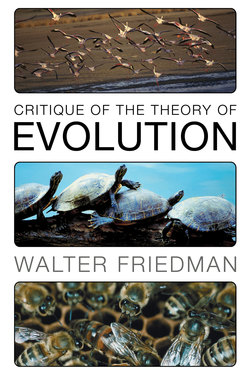Читать книгу Critique of the Theory of Evolution - Walter Friedman - Страница 4
На сайте Литреса книга снята с продажи.
Preface
ОглавлениеEvery book has its purpose, at least the author hopes so. The purpose of this book is to show that the theory of evolution is scientifically incorrect. This book is not a book on metaphysics or religion.
Chapters devoted to criticism of the evolutionary theory do not contain the words God, Intelligent Design, Messiah, etc.; one of the purposes of this book is to provide a scientific evaluation of the evolutionary theory without offering any alternative. However, these words do appear in Part III in discussions of legal matters.
What makes this book different from all the other books in this category? Before answering this question, let’s take a look at the other books in the field. In general, they could be divided into two major categories:
1) Books critical of the evolutionary theory written by theologians
The authors of these books assume that the Bible is correct. Though they may be right, this is a matter of faith and not of scientific truth, so their books completely miss the target.
2) Books critical of the evolutionary theory written by proponents of Intelligent Design.
Their brand of criticism could be summed up in the following sentence: modern life-forms are too complex to be thought to evolve from a single source known as the Original Cell.
But the phrase “too complex” lacks precise scientific meaning; therefore, this form of criticism is far off the target.
These two categories have one thing in common—their critics of Darwinism assume that it is imperative to replace the evolutionary theory with some other theory, be that a biblical account of the creation or an account of God as the Intelligent Designer. In reality, replacing the evolutionary theory with another alternative is an unnecessary requirement. As the history of science shows, the vast majority of erroneous scientific theories fell not because they were replaced with new, more sophisticated theories but because they contained either contradictory statements or statements that led to ridiculous conclusions, or both. Still, many people believe, for a variety of reasons, that a valid criticism of a scientific theory should offer an alternative theory that explains the same phenomena. But anyone familiar with the history of science knows that this is not always true. In fact, many theories, such as those of astrology and dialectical materialism, the concept of ether, the theory of transmutation of elements (this one comes from alchemy), etc., were thrown out without replacement—they were so ridiculous that no replacement was necessary.
The purpose of this book is not to replace the theory of evolution with some other theory or theological system, but rather to show that the weakness of the evolutionary theory’s arguments disqualifies it from being called a scientific theory at all.
If I decide to write another book as a continuation of this one I will definitely offer an alternative, but for the time being this is not my intention.
